- Home
- Lou Cameron
Stringer in Tombstone
Stringer in Tombstone Read online
STRINGER IN TOMBSTONE
STRINGER SERIES #7
LOU CAMERON
STRINGER IN TOMBSTONE
All rights reserved. Copyright © 1988 by Lou Cameron. This book may not be reproduced in whole or in part, by other means, without permission.
First ebook edition copyright 2012 by AudioGO.
All Rights Reserved.
Trade ISBN 978-1-62064-152-1
Library ISBN 978-0-7927-9070-9
Cover photo © iStockPhoto:dmathies
STRINGER IN TOMBSTONE
CONTENTS
CHAPTER ONE
CHAPTER TWO
CHAPTER THREE
CHAPTER FOUR
CHAPTER FIVE
CHAPTER SIX
CHAPTER SEVEN
CHAPTER EIGHT
CHAPTER NINE
CHAPTER TEN
MORE STRINGER ADVENTURES
CHAPTER ONE
“This reads plain impossible,” growled Sam Barca. The crusty old features editor of the San Francisco Sun read farther along the ticker tape before demanding, “How in blue blazes could a town in the Arizona desert get wiped out by a flood?”
Across the desk from him Stringer MacKail went on rolling a smoke. Younger and less excitable than Barca, he observed calmly, “I’ve seen it rain in Arizona, boss. It doesn’t happen all that often, but when it does, watch out.”
He sealed the straw-colored paper with his tongue and put the cigarette between his lips to light before he added, “On the other hand, this is the silly season. Mayhaps the wire service didn’t feel we’d want another two-headed calf or a hen that lays square eggs. Do they say just where in Arizona Territory it’s been raining so hard of late?”
Sam Barca nodded. “They do. Tombstone Township in Cochise County. They’re seldom so precise when they’re making up a silly-season filler from whole cloth. What are you working on right now, Stringer?”
A distinctly uncomfortable look crossed MacKail’s features as he replied, with some reluctance, “That argument old John Muir is having with the lumber barons about his pet redwood trees. Thought I’d run over to that grove he’s trying to save and see what all the fuss is about, if it’s all the same with you.”
Barca snapped, “It’s not. The lumber companies advertise in this paper a lot more than bird-watchers like Muir ever do. There’s no news in whether a redwood tree gets cut down or just goes on standing there. But this story about a whole town getting swept away by a desert deluge can’t offend any of our subscribers, whether it’s true or not. So you’d best run down to Tombstone and check it out.”
Stringer groaned in protest. “Sam, you don’t run down to Tombstone. You have to change trains a lot and it still takes forever. It’s a dinky mining camp tucked between the Mule and Dragoon mountains. When you get there, it’s nothing much. The mines bottomed out around the turn of the century. Anyone who would still want to live there no doubt deserves to be swept away by a flood.”
Barca put the snarl of ticker tape aside as he lit a smoke of his own in self-defense, muttering, “You can take a cowboy off his horse, but you can’t take the horse out of the cowboy. If you have to roll those hayseed cigarettes, can’t you at least buy tobacco less odorous than Bull Durham?”
Then, just as Stringer was beginning to think Sam had forgotten the dumb wire-service item, Barca shook out his match and mused aloud, “I recall a feature I rewrote about some derring-do in a town called Tombstone, one time. Must have been at least twenty years ago. Wasn’t Tombstone where that old windbag, Wyatt Earp, shot it out with Curly Bill at some corral?”
Stringer grimaced. “Nobody knows whatever happened to Curly Bill,” he replied. “Earp claims to have ended his career, in several odd ways, depending on which version Earp feels like at the moment. Old Wyatt and his latest wife are living right down the coast in L.A. He’s selling lots in the Hollywood subdivision and she’s trying to get into the nickelodeon game as an actress. I’m sure they’d both be proud to rehash his wild and wooly younger days with me, if that’s what you want.”
With a scowl, Barca snapped, “That’s not what I want. Nobody cares about what might or might not have happened in a rinky-dink desert town twenty years ago. I want you to cover what’s going on in Tombstone now. Make it interesting, and I’ll give you at least a column at space rates.”
As Stringer sighed and turned to leave, Barca demanded in exasperation, “Dammit, MacKail, why don’t you pack it in and take the front office up on that staff position? You’d make a heap more money and you wouldn’t get rained on half as much, you know.”
Stringer smiled sheepishly down at the deskbound Barca. “Rain or shine,” he told him, “I enjoy working in the field. You’re all too right about what a man can make, writing as a free-lance stringer. But what would I do with the extra money, chained to a damned old time clock?”
He left the frosted-glass corner cubicle before Barca could tell him how much fun it was to work locked up in a box. As he made his way through the crowded press room a pretty stenographer, pretending to be the Gibson Girl, dimpled at him and asked if he needed her services. He smiled back but shook his head and ducked around her. A man who messed with shemales where he drew his pay was a man who still had a lot to learn.
It was foggy outside that morning. He didn’t need Sam Barca to tell him there was no news in that. He’d gotten used to the Frisco fog, but it hadn’t been easy. Although he was a native Californio, he’d grown up on a cattle spread in the higher and drier Mother Lode country, a good eighty miles east of the Frisco Bay. He knew it would be sunny and dry where he was going, cuss all feature editors, so he was planning his wardrobe for the trip to Arizona well before he reached his boardinghouse on Rincon Hill, south of the slot.
As he climbed the stairs he saw that the gal on the second landing had her own sassy views about wardrobe, considering her door was wide open, as usual. The naked lady, smoking tailor-mades in her long ivory holder, worked nights as a nude model at the art school on Russian Hill. Stringer had yet to see a naked lady crossing Market Street, day or night, so he assumed she had to have some duds she wore, sometime. But he didn’t ask as he passed her door. Messing with gals where you ate could be a dumb as messing with ‘em where you got paid.
Up in his own smaller room under the slanting mansard roof, Stringer peeled off the dude duds they expected him to wear in the city and proceeded to put on the more comfortable working outfit of the still fairly wide outdoors. He hauled on his denim jeans easy enough. He had to haul harder to get his spurred black Justins on; riding boots that weren’t too tight when you put ‘em on meant you weren’t too serious about riding.
He tucked a lighter blue work shirt’s tails into the jeans and donned a denim jacket over it. He tied a black sateen bandana around his tanned throat in lieu of a tie and topped himself off with the battered Roughrider hat he’d brought home from Cuba. He decided to pack his .38 Smith & Wesson double-action in with the yellow slicker and other possibles. He had to sit on the old gladstone bag to lock it—heading into the Arizona desert when it was acting so odd called for more than the usual possibles.
He was braced for caustic comments on his appearance as he passed the gal on the second landing again, but she just blew some violet-scented smoke and a disgusted look his way. He hoped she was starting to give up on him, too. The situation was rough on both of them, if she had any feelings at all.
The depot was only a short walk toward the waterfront. He got aboard one of the frequent S.P. Coasters, bless it, just as it was fixing to roll south. He waited until they were below San Jose, with nobody fighting him for his seat or space on the overhead luggage rack, before he got up and ambled back to the observation car. He didn’t wan
t to observe anything. He’d made this same eight-to-ten-hour trip too often to expect unusual scenery, but they had a bar back there as well.
Stringer ordered Steamer beer and found an empty seat near the door to the rear platform. He’d just settled down when a heavier-set gent, a few years older than he, sat down beside him to ask if he wasn’t Stuart MacKail of the Sun.
“My friends call me Stringer,” he answered, sighing. “I know it’s sort of lowly. But, when I don’t watch out, there’s this tendency to shorten Stuart to Stu, and that’s a fitter name for cow-camp grub than a former cowhand.”
Chuckling, the stranger said, “My folk didn’t let me choose my own name, either. I’m Homer Davenport. I’m working free-lance now, too. Some editors just have no sense of humor.”
Stringer considered the older newspaperman with new respect. “I know the feeling. I’ve seen your political cartoons. You’re good, as well as funny. I admired that one you drew of Senator Mark Hanna, dressed in a suit of dollar bills. You headed for L.A., Homer?”
“May as well,” Davenport grunted. “I just paid a visit to my old hometown, Silverton, Oregon, up the coast. I don’t know why. There sure as hell aren’t any jobs for us artistic types and, every time I get away for a while, I forget how spiteful small-town folk can be about a local boy who made good.”
Stringer nodded his understanding. “I get that every time I go back up to Calaveras County. I suspect that when we’re not in town they like to brag on knowing us when. Maybe we’ll both wind up as small-town brags.”
Davenport said his own hometown was free to name itself after him, for all he cared. He asked Stringer where he was headed and was told, “To another small town that brags about old boys it had little or no use for when they were in town. You ever heard of Tombstone, Arizona?”
Davenport said, “Sure. Silver mining, right?”
With a wave of his hand, Stringer answered, “Once upon a time—back in the seventies a prospector named Ed Schieffelin struck silver in the Dragoon foothills. It was still Apache country and he’d been told the only thing he’d find in such uncouth parts was his own tombstone. So that’s what he named his find, the Tombstone Lode.”
“Yeah, I recall the rush,” Davenport broke in. “It sounded like a great adventure, but my folks wouldn’t let me go. Probably just as well. I heard it was one tough little town while it lasted. You say it’s still there?”
Stringer explained, “That’s what I’m supposed to find out. The wire services report it swept away by a flood. I had it down as a ghost town, too.”
Davenport showed he’d been around by agreeing, “Few silver towns last all that long. If Tombstone lasted twenty years that cuss must have struck a vein indeed. When did it bottom out?”
Stringer answered, “Like you said, about twenty years after old Ed Schieffelin found it. Lord knows what they’ve been doing there since. But if nobody was still there, we’d have never heard about that flood.”
They rode in silence for a time. Then Davenport mused, “It’s starting to come back to me. Didn’t the notorious Wyatt Earp do wonders and eat cucumbers in Tombstone, years ago?”
“He wasn’t notorious back then. But in recent years he’s been selling real estate down in Hollywood and the gents who write one-reelers for the nickelodeons have sort of discovered him. Wyatt’s been giving ‘em pointers on the Wild West and, hell, how are they supposed to know?”
Davenport laughed. “They were showing The Great Train Robbery in Portland as I passed through. I thought it was supposed to be a comedy till everybody wound up dead,” he said, shaking his head in amused wonder. “Why don’t they hire old boys that was there, if they want some tips on making Wild West pictures? Buffalo Bill, Frank James, and even Cole Younger are still around if they want to be authentic.”
Stringer shrugged. “Old-timers like Wyatt Earp no doubt work cheaper, whether he was there or not.”
Tiring of the subject, they wandered on to other topics of mutual interest to newspapermen, bought each other a few rounds, and then Davenport consulted his watch and announced, “If we don’t ease our way up to the dining car before the noonday rush we’ll have to stand in line and eat off dirty linen.”
Stringer agreed that sounded dreadful, so they headed for the dining car. It was quite a hike, since one was expected to drink at the rear yet eat at the front of the S.P. Coaster. They got there just as a colored waiter was starting to move back the other way with a set of chimes to signal the start of the stampede. He gave Stringer a dubious look. Stringer was glad he had on his bandana; they sure were getting fancy on the S.P. line.
Dressed more properly, Davenport led the way to a table near the far end and the two men sat down. When another waiter came to take their orders Davenport refused to surrender his menu, saying he intended to keep it as proof they actually wanted thirty-five cents for a plate of plain old roast beef. The waiter didn’t argue; he was working for tips.
Stringer said he’d have fish, just for the halibut. As the two of them waited for their orders he sipped ice water and watched, bemused, while the cartoonist sketched something or somebody on the back of his menu with quick sure strokes of his pocket Waterman. Stringer could see it developing into the head and shoulders of some cuss. He said, “I’d have worn my suit and tie, had I known I was to be immortalized by the one and original Homer Davenport.”
The cartoonist replied in a near-whisper, “I’m not drawing you. Don’t turn around. There’s a mean-eyed rascal, two tables behind you, who’s been dogging your tracks since you first came into the club car.”
Stringer suggested, “Mayhaps he just likes to drink beer and eat lunch, the same as the rest of us.”
But Davenport insisted, “Trust me. I’m a knockaround hairpin with an eye for trouble. I did consider the simple fact that it’s a free country, back in the club car. But the jasper’s been staring at you, and keeping you in sight, in a manner that would be suggestive of a jilted lover—if either of you looked the type.”
He handed the sketch across the table. Stringer murmured, “I’d have never left my .38 packed away if I’d expected anything this ugly to be aboard the same train.”
Asked if he knew the mutt Davenport had just sketched, Stringer had to think about it. He knew Davenport was good. The notorious cartoon he’d drawn of Mark Hanna had been a perfect likeness, if somewhat vicious, so it was safe to assume that the mysterious gent glaring at his back right now did have eyebrows that met in the middle, and didn’t shave his lantern jaw too often. Davenport had sketched his duds less definitely, with just a suggestion of an open shirt under a checked coat or vest. Stringer asked the cartoonist which they were talking about and Davenport said, “Sporty vest, red and green plaid over a dark blue army or work shirt. For Pete’s sake, you need more than a face like that to go on?”
Stringer replied, “I’ve never seen the ugly cuss before. Is he wearing a gun rig?”
“Not so far,” Davenport answered. “He could be packing a belly gun and, either way, he has that walk.”
Stringer didn’t ask what kind of a walk. He was a knockaround hairpin, too, and once one became familiar with the tensed-up stride of trouble in motion, further description was academic.
Davenport continued, “There’s two of us to one of him, and I just so happen to have a four-shot .32 in my breast pocket.”
Just then the waiter brought their orders, so Stringer waited until they could discuss such matters in private before he told his fellow newspaperman, “I heard you Oregon loggers were sort of prone to direct action. I’m a dally roper, myself. I like to play the critter with enough slack to keep us both from looking foolish.”
Davenport insisted, “Even as we discuss the son of a bitch he’s glaring daggers at your back.”
Calmly, Stringer replied, “That, too. If just looking dirty counted, I’d no doubt be engaged—or worse—to an artist’s model I know back in Frisco.”
He swallowed a morsel of halibut steak before h
e added with a faintly embarrassed grin, “Since you must have gone to art school, there’s a question about such studies that I’ve always been curious about. When you old boys are sitting there, drawing pictures of a stark-ass nude model, does it or does it not give you a hard-on?”
Davenport chuckled wistfully before replying, “It depends on how good-looking they are. We weren’t supposed to take models out, and vice versa, but sometimes there was more vice than versa. I can’t speak for the female or effeminate students in my class, of course. I only recall both groups blushing more than I did when we had male models to sketch. You can sketch a naked lady’s welcome mat with just a few side swipes of a Conté crayon, but you have to look harder, and let everyone else see you’re looking harder, when it comes to rendering the details of male anatomy.” Then he said, “Uh-oh, the brute who’s been acting so interested in your anatomy is getting up from his table. I never took him for a picky eater on a diet, but, there he goes. I hope he’s not planning to ambush you in the gent’s room.”
He wasn’t, it turned out. Just as Stringer and Davenport were deciding on dessert, the train stopped at Soledad and Davenport gasped, “There he goes! On the double!” Stringer turned just in time to see a hulking figure obscured by window grime and steam as it dashed across the platform to vanish into the little depot. Davenport read the sign above the depot door and muttered, “I didn’t know this was a regular stop. What do they grow in Soledad?”
Stringer, who rode this line more often, said, “Mostly fruit and truck. I hear there’s a prison camp around here, too. You’re right about it not being a regular stop. You have to flag the engine if you want to get on, or ask the conductor if you want to get off, in Soledad.”
Davenport opined, “He sure must have wanted to get off, and I just can’t see him as a farm worker. Maybe he wants to visit some kin?”

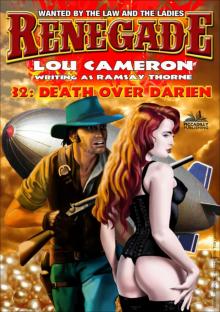 Renegade 32
Renegade 32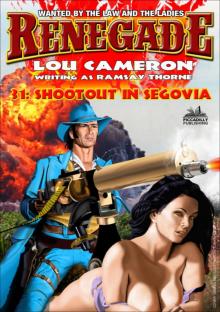 Renegade 31
Renegade 31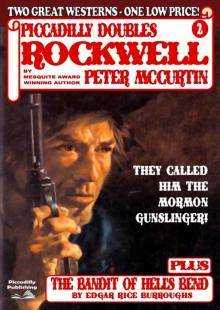 Piccadilly Doubles 2
Piccadilly Doubles 2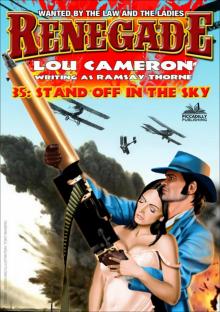 Renegade 35
Renegade 35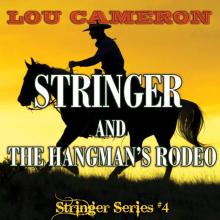 Stringer and the Hangman's Rodeo
Stringer and the Hangman's Rodeo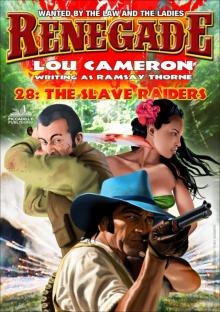 Renegade 28
Renegade 28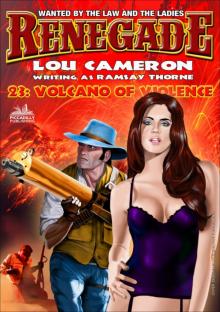 Renegade 23
Renegade 23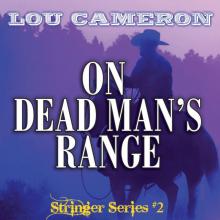 On Dead Man's Range
On Dead Man's Range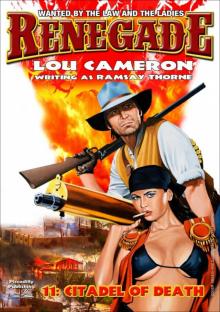 Citadel of Death (A Captain Gringo Western Book 11)
Citadel of Death (A Captain Gringo Western Book 11)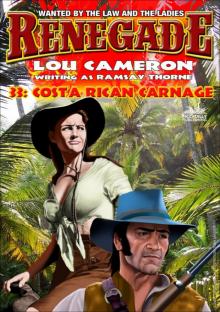 Renegade 33
Renegade 33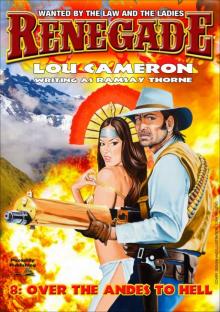 Over the Andes to Hell (A Captain Gringo Western Book 8)
Over the Andes to Hell (A Captain Gringo Western Book 8)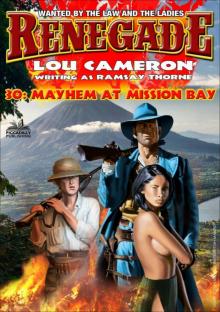 Renegade 30
Renegade 30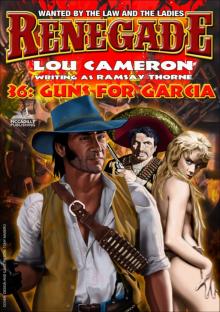 Renegade 36
Renegade 36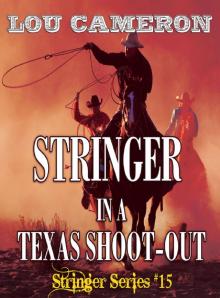 Stringer in a Texas Shoot-Out
Stringer in a Texas Shoot-Out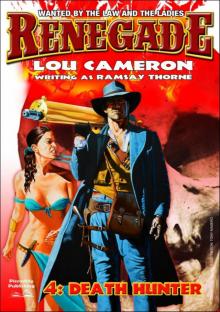 The Death Hunter
The Death Hunter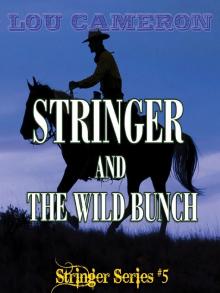 Stringer and the Wild Bunch
Stringer and the Wild Bunch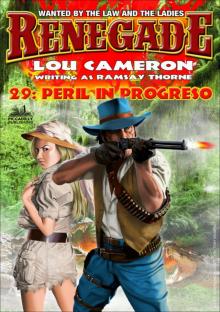 Renegade 29
Renegade 29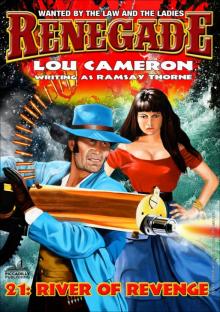 Renegade 21
Renegade 21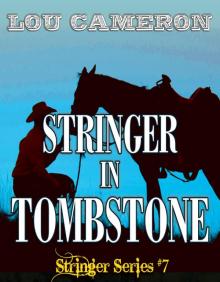 Stringer in Tombstone
Stringer in Tombstone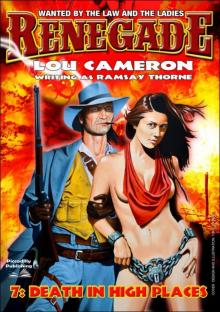 Death in High Places (A Renegade Western Book 7)
Death in High Places (A Renegade Western Book 7)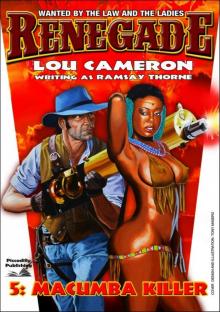 Macumba Killer
Macumba Killer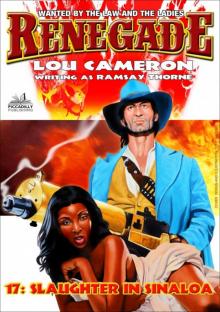 Renegade 17
Renegade 17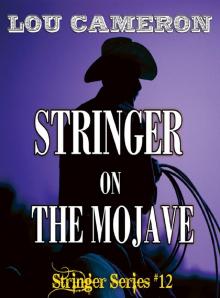 Stringer on the Mojave
Stringer on the Mojave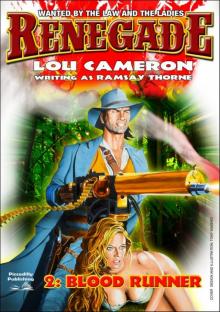 Blood Runner
Blood Runner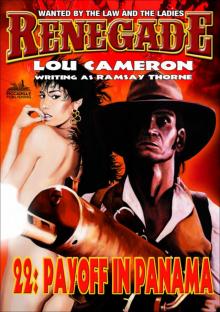 Renegade 22
Renegade 22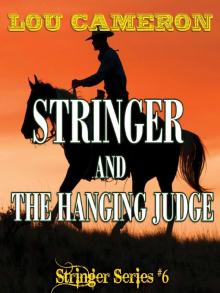 Stringer and the Hanging Judge
Stringer and the Hanging Judge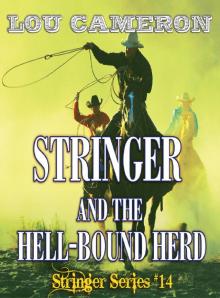 Stringer and the Hell-Bound Herd
Stringer and the Hell-Bound Herd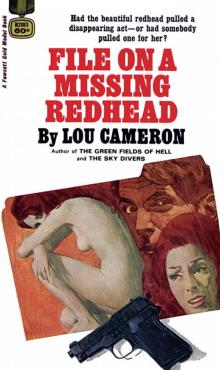 File on a Missing Redhead
File on a Missing Redhead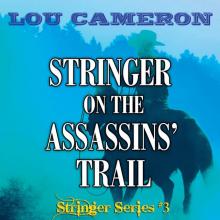 Stringer on the Assassins' Trail
Stringer on the Assassins' Trail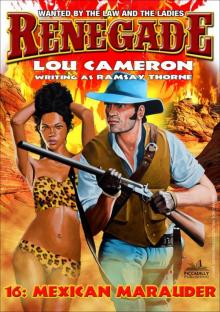 Mexican Marauder (A Captain Gringo Adventure #16)
Mexican Marauder (A Captain Gringo Adventure #16)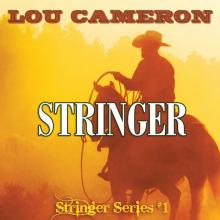 Stringer
Stringer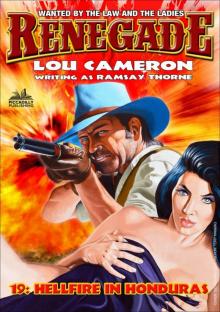 Renegade 19
Renegade 19 Stringer and the Oil Well Indians
Stringer and the Oil Well Indians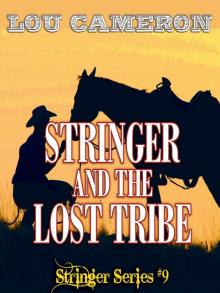 Stringer and the Lost Tribe
Stringer and the Lost Tribe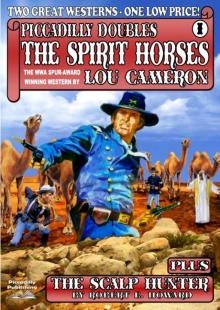 Piccadilly Doubles 1
Piccadilly Doubles 1 Stringer and the Border War
Stringer and the Border War Renegade
Renegade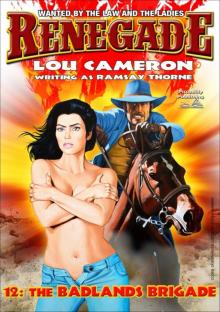 The Badlands Brigade (A Captain Gringo Adventure Book 12)
The Badlands Brigade (A Captain Gringo Adventure Book 12)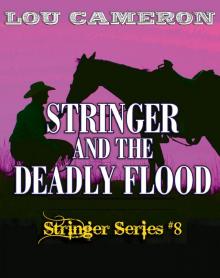 Stringer and the Deadly Flood
Stringer and the Deadly Flood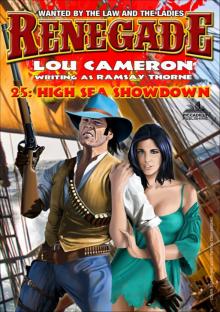 Renegade 25
Renegade 25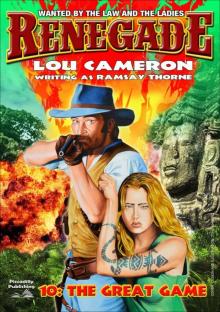 The Great Game (A Captain Gringo Western Book 10)
The Great Game (A Captain Gringo Western Book 10)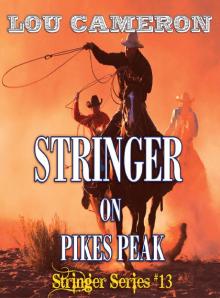 Stringer on Pikes Peak
Stringer on Pikes Peak